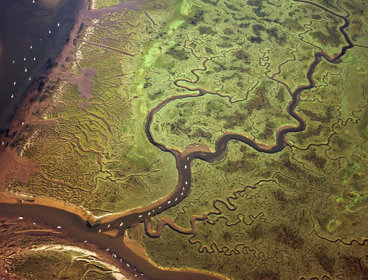By its very nature geographical field research is intertwined with environment and place. Issues related to the impact of working on and in an environment must be considered. These range from impact on the actual study site, to sampling and the use of resources, to the use of materials in the field and lab, to the environmental impact of travel to and from the site.
Travel and carbon emissions
Researchers should be attentive to the use of resources associated with travel. To the extent possible, fieldwork projects should look to minimise carbon emissions and resource used.
Careful attention should be directed to all elements of travel and use of resources. Low carbon travel should be used where this is a realistic option, and carbon offsetting should be carefully and critically considered.
Remote fieldwork, shifting the ownership of data collection to international, in-country project partners can remove the need for elements of travel (and have other benefits too). Where in-country expertise is present it should be considered how necessary it is to travel to the field site and/or if there are options to train local project partners to undertake, or continue, data collection, removing the need for subsequent return trips.
Where travel is required, researchers should plan accordingly to make the most of their travel. Researchers should spend an appropriate amount of time working and collecting data at their field site given the travel they have undertaken. At the field site, as well as data collection, researchers should consider the opportunity to build collaborations, exchange knowledge and expertise, and communicate research to relevant audiences.
Environmental impact of all elements of the project
Immediate thoughts of the environmental impact of fieldwork often relate to travel. While this is a big contributor to a project’s carbon footprint, the environmental impact of all elements of a project should be considered. These may include, but are not limited to:
- Using resources at the study site where these resources might be scarce (e.g. water).
- Camping at a site and disposing of waste.
- Damaging flora and fauna in what might be a fragile ecosystem.
- Single or limited use plastic and equipment that is subsequently discarded.
- Analysis of samples in the lab and the materials used.
- Processing, modelling and storing of data and the energy demands required.
- Just as researchers should undertake a risk and ethics assessment, an environmental impact assessment should also be undertaken – both to consider the potential environmental impact of the research and how this can be minimised. One example framework has been created by Canterbury Christchurch University.
Physical sampling
The physical extraction of samples, whether this be plants, sediments, rocks, organisms, water or something else, should be done to an extent and in a way that minimises any impact on the environment.
- Researchers must respect and follow relevant local, national and international laws around sample collection and the export and import of samples, with appropriate permissions gained where required.
- Specific consideration should be made when working on Indigenous lands (link to permissions and land ownership below).
- Sampling methods should be chosen or adapted to be less destructive and extractive, with careful thought to whether a sample is necessary to collect.
- Samples should be preserved where possible and stored appropriately such that they can be studied by future researchers.
- If samples are collected and do not need to be removed internationally, researchers should think about whether samples might be of benefit to a local institution for research or teaching. At the very least samples and data gained should be made available to local collaborators.
Working with/on animals
- Work with animals should always be carefully considered and done with a high regard for animal welfare.
- Where research requires the use of animals and offers considerable benefit, researchers should consider the principles of the 3Rs, to wherever possible, replace the use of animals, reduce the number of animals used, and refine methods to minimise suffering.
- Any research with animals must follow UK regulation or licensing procedures as outlined on the Home Office website and be respectful of local conventions and customs
Biological sampling in the field
- Biological sampling should be carefully considered to determine whether the value of the research justifies the methods used and resulting impact on wildlife, especially when working in protected areas and with threatened species.
- Where possible, low intrusive methods of sampling and observation should be used (e.g. camera traps, biological tracers such as eDNA, drones)
- This article 'Ethics needed in fieldwork as well as the lab' presents 10 considerations for respectful conduct before, during and after biological field sampling.
Permissions and land ownership
It is essential to gain appropriate permissions to work in an environment and on certain lands. Positive community and cross-cultural relationships should be built from the outset, and researchers must be clear, open and honest about their plans, aims, purpose of the research, how data will be used and what the outputs will be.
- Appropriate acknowledgement should be given to communities and land owners
- Behaviour at the site must be appropriate, respectful and work within cultural norms and customs.
- If working on Indigenous lands, Indigenous perspectives, knowledge and relationships to the land must be respected. Working on these lands and taking samples may have different meaning to Indigenous communities.
- Principles of Indigenous self-determination (a right to freely determine political status and pursue economic, social and cultural development) and Indigenous leadership in both why and how research is done must be followed.
Questions to think through
- Do you need to travel to your study site, and if so, are you using low-carbon travel options when possible?
- If you are travelling, are you making the most of your fieldwork, through collecting data, meeting and working with collaborators and sharing your work?
- Have you undertaken a carbon audit to determine the carbon footprint of your project?
- Have you considered the environmental impact of all aspects of the project, both in the field and on your return?
- Have you checked that you are abiding by local regulations when working in the field, including for physical sampling, and have all permissions in place?
- Are you using less destructive and extractive, low intrusive sampling methods where possible, and only sampling what you need? Can you justify any impact on wildlife and the ecosystem?
- If working with animals, are you following the 3Rs?
Resources
Getting the most out of fieldwork
Richard Phillips and Jennifer Johns (UK)
A student-targeted chapter from 'Fieldwork for Human Geography' (Sage, 2012), giving a summary of key points of the critical evaluation of fieldwork. It asks questions including 'Is fieldwork environmentally sustainable?' and 'Is fieldwork ethical?' providing a very helpful introduction to get you thinking about these key questions.
Does Geography have an emissions problem?
Whitney Love and Joe Williams (UK)
A Geography Directions post discussing emissions in higher-education geography, including the role students should play in discussing climate issues.
Environmental Field and Research Audit
Canterbury Christ Church University (UK)
Fifteen questions to help you consider the potential environmental impacts of your fieldwork, and how you might mitigate these. Have you considered the use of scarce resources at you your field location? Do you consider the environmental costs to undertake the activity are justified?
Online carbon calculators
Caplor Energy (UK)
An evaluation report on online carbon calculators in the UK, providing a useful links to online carbon calculators, with a summary of each.
Best Practice Guidance and Ethical Fieldwork Code of Conduct
Oxford Central University Research Ethics Committee (CUERC)
Best practice guidance with good advice about working with local communities in section 4 – Building cross-cultural relationships.
UCL biosecurity notes
University College London (UK)
A short summary paragraph noting issues to consider and best-practice around eliminating the spread of invasive and alien species between sites.
Policy on use of animals in research
UK Research and Innovation – Engineering and Physical Sciences Research Council (EPSRC)
A collection of key resources on the use of animals in research.
Statement of the Royal Society’s position on the use of animals in research
The Royal Society
Contains a set of nine expectations for the use of animals in research, providing key points to consider when using animals in research.
Animal testing and research: guidance for the regulated community
GOV.UK
Includes technical advice and guidance on harm-benefit analysis and working with animals taken from the wild.
Co-Creating Ethical Practices and Approaches for Fieldwork
Juliet Ryan-Davis and Daniella Scalice
An article presenting ideas and recommendations applicable to Earth sciences (but with themes relevant to all field research), centered around working with and within Indigenous communities and lands.
A Guide to applying The AIATSIS Code of Ethics for Aboriginal and Torres Strait Islander Research
Australian Institute of Aboriginal and Torres Strait Islander Studies (AIATSIS)
A practical resource for implementing key best practice principles when working with and within Indigenous communities and lands.


